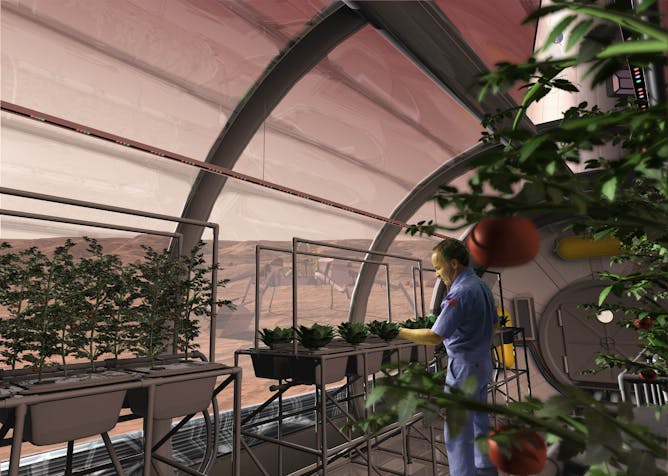|
With all the excitement about sending astronauts to Mars to explore the possibility of building human settlements on the planet, one question comes to the forefront: but what will they eat?
Today in The Conversation Canada, Lenore Newman at the University of The Fraser Valley and Evan Fraser at the University of Guelph write about their new book, Dinner on Mars. In it, they explore the innovative and spectacular approaches to food production that will need to come into play, from cellular agriculture to specialized greenhouses. “Imagining what agriculture could be like on Mars is a fascinating project,” they write, “but it’s when we think about how these technologies may affect life on Earth that this topic becomes extremely serious.”
Also today:
Regards,
|

Growing food in space will rely on innovative agricultural technologies.
(NASA)
Lenore Newman, University of The Fraser Valley; Evan Fraser, University of Guelph
Agricultural technologies to grow food on Mars can help address climate change, sustainability and food scarcity challenges.
|

Canada’s extension of copyright to 70 years after an author’s death puts corporate profits ahead of the public interest.
(CHRISTOPHER DOMBRES/flickr)
Lisa Macklem, Western University
Canada’s extension of copyright might be good for corporations that hold copyrights, but it’s bad news for creators and the public.
|

Recruits attend military training at a firing range in the Krasnodar region in southern Russia in October 2022, eight months into Russia’s war in Ukraine. The mobilization of recruits was a sign of Russian acknowledgement that it was engaged in full-fledged war, not a ‘special military operation.’
(AP Photo)
Alexander Hill, University of Calgary
Russia’s army in Ukraine is fighting a much more artillery-intensive and methodical war than it was almost a year ago.
|

Voting silences voices. Listening deeply to people in your group leads to more robust and better decisions.
(Shutterstock)
Mel Rutherford, McMaster University
In formal consensus decision-making, no proposal is adopted until every concern is heard, understood and addressed. Here’s how it can work.
|

Un restaurant du Vieux-Montréal. L'implantation des modules électroniques des ventes dans les restaurants du Québec, il y a dix ans, a permis au gouvernement d'aller chercher plus d'un milliard de dollars additionnels en contributions fiscales de toutes sortes.
La Presse canadienne/Graham Hughes
Martin Boyer, HEC Montréal; Philippe d'Astous, HEC Montréal
L’implantation obligatoire des modules électroniques des ventes dans les restaurants du Québec, il y a dix ans, a eu d’importants impacts, dont plus d’argent dans les poches de l’État.
|
Education
|
-
Catherine Wade, University of Sydney
Children between 10 and 12 are still more influenced by their parents than their friends. This makes it the ideal time for parents to set the tone for when their child crosses over into adolescence.
|
|
Environment + Energy
|
-
Hannah Power, University of Newcastle; Kendall Mollison, University of Newcastle; Michael Kinsela, University of Newcastle; Tom Hubble, University of Sydney
From a shipwreck to ancient dunes, these researchers created 3D visualisations of seafloor features around Australia – from as shallow as 22 metres to depths of over 4.8 kilometres.
|
|
Politics
|
-
Alonso Gurmendi Dunkelberg, University of Oxford
More than 50 Peruvians have died in rioting as the South America country faces a severe constitutional crisis.
|
|